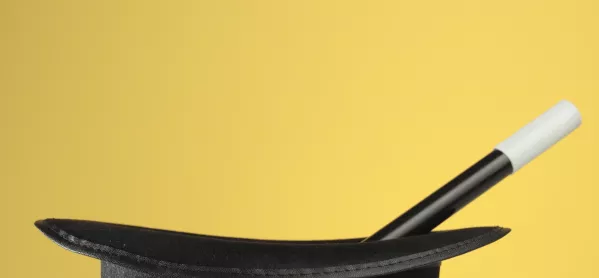- Home
- Could Derren Brown make you a better teacher?
Could Derren Brown make you a better teacher?

A magician approaches you, holding a deck of cards.
She shuffles them awkwardly.
A couple fall to the ground.
Quick read: Three ways to be a better teacher - by using magic
Quick listen: The problem with whole-school behaviour policies
Want to know more? We’re making it hard to make it look easy
This is an act. She could, if she wanted to, confidently stride over, springing the cards between each hand, and shuffle them in an astounding display of dexterity.
But she doesn’t. Why not?
For magicians, if you look like you can do anything, your trick won’t look like a miracle. It’s all part of a persona, something that magicians guard as much as their methods. Personas can make or break an illusion.
This is the same for teachers. No matter how well-differentiated and resourced our lessons are, no matter how much we plan, our persona -our attitude, personality, demeanour - can either demolish our lesson or raise it to brilliance.
So let’s examine some magical personas, and explore why they are so effective. By watching closely, we may pick up on some secrets.
Penn and Teller
These Las Vegas kings of magic are a perfect match. Penn, the booming, commanding giant that began his performance career as a juggler, is juxtaposed on-stage with the silent, calm Teller. It shouldn’t work, but it does.
We could all probably name some loud and calm colleagues ourselves, but we know these personas rarely work perfectly. How do Penn and Teller do it?
The trick here is to not adhere to loudness or calm exclusively. The trick is to be able to shift between a Penn-esque thunder and Teller-like peace.
In any of their shows or filmed performances, you’ll see routines quickly move from a loud, entertaining and thrilling Penn-focus to a soulful and riveting Teller-focus. At times the spotlight only goes on one of the two.
Of course, as teachers, we want students to be excited to enter our classroom, and it can be tempting to assume a bombastic attitude all of the time, to push the excitement factor.
But if we learn to be diverse, and try to enthuse through the silent charisma of Teller, we may find our students filled with quiet confidence rather than pure excitement.
Derren Brown
It may not surprise you to learn that Teller was once a teacher. Brown, on the other hand, was studying law until he saw a hypnotist perform and decided to explore the avenue of psychology and magic.
Brown’s tricks look like genuine magic, but it’s mostly down to the way he acts. He very often takes fantastically simple methods and dresses them up with a tightly scripted repertoire of speech and movement.
Here’s an example you can try: ask someone to think of a number between one and ten. People usually pick seven (with three a second choice). If you proceed to flatly tell your volunteer “You’re thinking of seven,” they’ll respond with “Ah, I bet everyone thinks of seven.”
But should you play the trick like Brown would - demand they think of a number, concentrate, picture the number on fire, if you close your eyes and say “it begins with an ‘S’…”, pretend to struggle - by the time you say “seven,’ you will look like a genuine mind-reader.
Essentially, you just act like you are really doing some mind-reading when you’re really relying on pure chance. If you act well enough, any wrong guesses will be ignored.
For us teachers? Brown tells us that to use the simple, standard and traditional methods is best. Excitement and engagement won’t come from an immaculately designed sheet or task differentiated seven different ways, it will come from your behaviour. Brown tells us to keep the method simple - and sell with our persona.
Ollie Mealing
Mealing specialises in incredibly personal, one-on-one performances. He works simply, and his resources are minimalistic. Very little trickery happens when the cards are in his hands.
It all comes from his warm, Bob Ross-like demeanour. His routines are like short motivational speeches, and he performs like he is only performing for one person.
His spectators are entranced as he often places himself directly in front of them and maintains eye contact. He will only pick something up if he needs it immediately.
This is something to mirror in our classrooms. Keeping things minimal, remembering that the magic comes from us, not our resources, and speaking as if we are only speaking to one student emanates this subtle, soothing aura.
No magician sticks to one tone, however. The key is diversity, and to remember that the secret is all in the performer, not the tools.
Before moving to the US, William Lismore was an English teacher. He now works with adults learning basic literacy and earning their high school diplomas
Keep reading for just £1 per month
You've reached your limit of free articles this month. Subscribe for £1 per month for three months and get:
- Unlimited access to all Tes magazine content
- Exclusive subscriber-only stories
- Award-winning email newsletters
